When it comes to melatonin, many people’s first reaction is probably its use in treating insomnia, which is also the question of why it can help with sleep. But the simple answer to this question is that while melatonin is indeed related to sleep, whether it really helps with sleep is still questionable. In fact, you may not know that the functions of melatonin may be much more diverse than you think.
The function of melatonin extends far beyond regulating sleep.
Melatonin’s role extends far beyond regulating sleep. Melatonin, from its name, seems to have little to do with insomnia or sleep aids. In fact, melatonin was first discovered in research on reptiles and amphibians in 1917. For example, frogs are pitch black when they are born as tadpoles, but the black color fades as they mature, which is the result of the effects of melatonin.
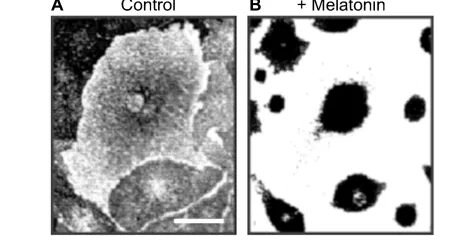
Frogs and other amphibians have melanin evenly distributed inside pigment cells (Figure A). When stimulated by melatonin, melanin will rapidly move and aggregate, resulting in a “fading” effect (Figure B) | Source: Sugden D, et al. 2004.
However, the mechanism of “fading” is not the same for amphibians and mammals, and there is currently no research showing that melatonin can achieve a whitening effect. Speaking of different animals, the evolutionary history of melatonin may be far beyond your imagination: from different animals and plants to the most primitive blue-green algae and myxobacteria, the presence of melatonin has been detected. In blue-green algae and bacteria, melatonin performs not only the function of aiding sleep or fading, but also regulates photosynthesis. About 2.5 billion years ago, with the emergence of plant photosynthesis, the oxygen concentration on Earth quickly increased, which brought negative effects to organisms – oxygen can produce highly reactive free radicals, which, although promoting energy metabolism, can accumulate to cause toxicity. Therefore, melatonin, as a substance that removes and controls free radicals and has antioxidant properties, was naturally selected. However, from the widely distributed melatonin today, its function is not so simple – in fact, with the complexity of organisms, its function has become multifaceted.

The functions of melatonin in different organisms are constantly evolving and becoming more diverse, including growth, immunity, circadian rhythm, sleep, anti-cancer effects, and more | Source: Zhao D, et al. 2019.
Going back to the issue of free radicals, because oxygen production is related to sunlight, there are more free radicals during the day and less at night, which makes melatonin a substance related to circadian rhythms. Current research has indeed found that melatonin in the human body begins to rise steadily around 9 pm in the evening and reaches its highest value at midnight, followed by a continuous decrease as daylight approaches. Although there has been a lot of research focusing on the relationship between melatonin and circadian rhythms, the underlying mechanisms are very complex and may involve factors such as nerves, hormones, metabolism, and more.
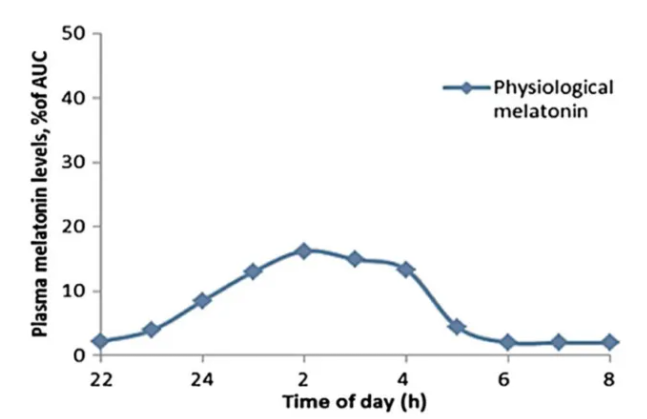
With the emergence of animals and plants, organisms became increasingly complex and could no longer rely on a single cell to secrete melatonin. As a result, a specialized organ called the pineal gland appeared.
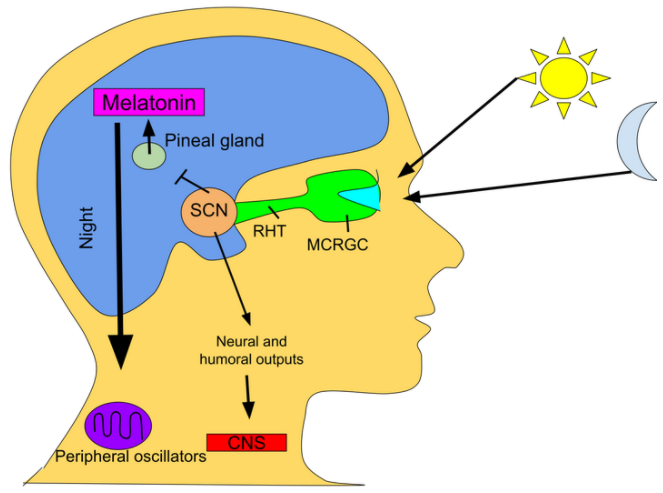
Mechanism of action of melatonin | Image source: Wikipedia
In simple terms, light stimulation, especially short-wavelength light (such as blue light), is transmitted through our eyes to the pineal gland in the brain, causing the secretion of melatonin to be suppressed. On the other hand, the suppression of melatonin secretion leads to the secretion of hormones, keeping people awake and alert. In contrast, when there is no light, melatonin will be continuously produced, causing people to feel tired.
It seems that melatonin has become a “cure-all”
As mentioned earlier, the original function of melatonin was not to aid sleep, and even its sleep-promoting effect only appeared later in biological evolution. Due to its inhibitory effect on free radicals, melatonin’s earliest functions were related to immunity, growth, and even anti-cancer properties. Although it may be somewhat off-topic, it is still worth mentioning.
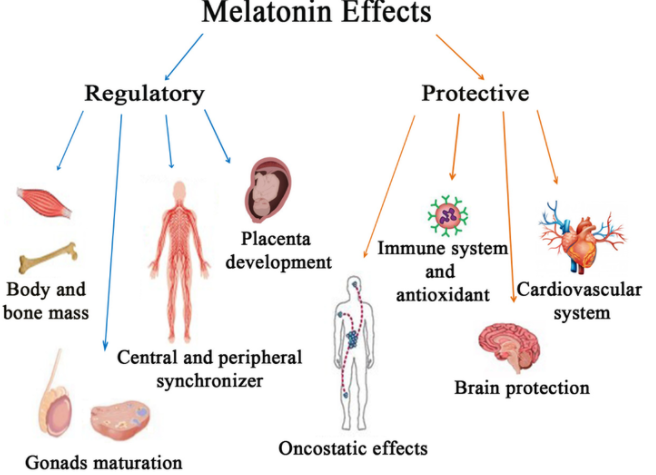
The multiple functions of melatonin | Source: Ferlazzo N, et al. 2020.
Melatonin itself is a type of antiestrogen hormone that regulates reproductive function in both men and women. Simply put, melatonin secretion can control the maturation of our reproductive organs and has been reported to play a role in gynecological diseases with excessive estrogen secretion, such as polycystic ovary syndrome and premature ovarian failure. Melatonin also plays a role in bone formation pathways, as studies have found that the decrease in melatonin secretion at night is related to an increased risk of fractures. As a potent antioxidant (with twice the antioxidant capacity of vitamin E), melatonin has an important role in anti-inflammatory and protective functions. Due to its close relationship with day and night and seasonality, melatonin has also been found to be associated with seasonal immune regulation: most immune cells have melatonin receptors to adapt to different day and night and seasonal changes. Even in the past two years, studies have found that melatonin can play a role in the treatment of COVID-19, as it has regulatory functions on immune cells. However, are these studies reliable? We know that all medicines have side effects, and melatonin is no exception. Excessive use of melatonin may cause side effects such as excessive sleepiness, dizziness, and headaches. Moreover, there is currently no consensus on the optimal amount of melatonin injection for optimal effect. We only know that taking melatonin orally is relatively safe, but are these impressive effects the result of correlation or are there clear mechanisms behind them? We still do not know.
Does melatonin really help with sleep? Is it really necessary to use melatonin?
Is melatonin really effective for insomnia? Is it really necessary to take melatonin? First of all, through statistical surveys, it can be determined that melatonin is closely related to sleep and light. As mentioned earlier, research has found that as we age, the amount of melatonin in our body decreases, which may be why older people sleep less and are more prone to insomnia. Statistics have found that young people (around 20 years old) who use their phones or tablets for more than two hours before going to bed will have 22% less melatonin secretion than others. For specific conditions such as primary insomnia and delayed sleep phase syndrome, melatonin does have some effectiveness.
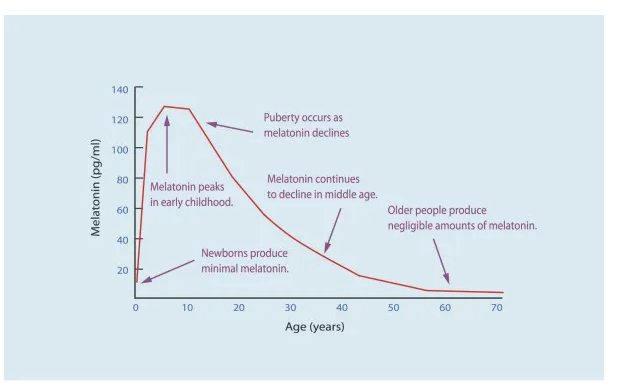
The level of melatonin varies with age, increasing continuously from 0-18 years old, but then gradually decreasing in adulthood. | Image source: Grivas T B, Savvidou O D. 2007.
On the other hand, external intake of melatonin is not always effective. On the one hand, melatonin must be absorbed in order to take effect. However, in different studies on liver metabolism, the utilization rate of externally administered melatonin varies greatly – from as low as 3% to as high as 50%. In other words, it is difficult to say whether the melatonin you take will be effective. On the other hand, the levels of melatonin in different individuals or in the same individual under different conditions are inherently uneven. One study found that melatonin has more or less relationship with factors such as genetics, age, contraceptive drugs, weight, education, employment, and contact lens use. This raises another question – how much melatonin should be taken if you want to take it? There is obviously no standard answer to this.
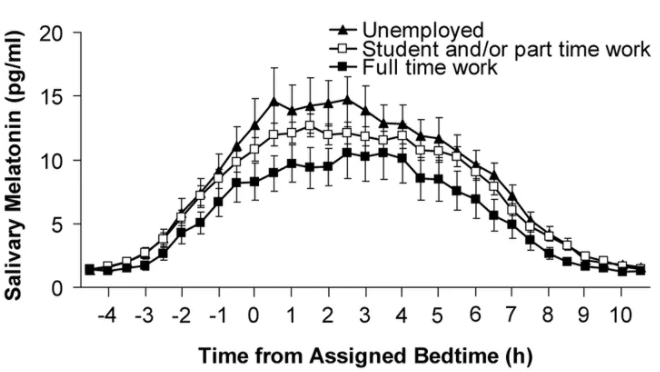
This interesting study found that the more you work, the lower your melatonin levels will be. | Image source: Burgess HJ, Fogg LF. 2008.
Besides simply supplementing with exogenous melatonin, what other ways can we improve sleep? In fact, some methods were mentioned earlier: the production of melatonin is related to the blue light that our eyes receive, so a good way to improve sleep is to avoid looking at electronic devices before bed – the blue light they release may deceive your pineal gland and prevent the release of melatonin. Similarly, if you’re afraid of the dark, try using warm-colored lights, which will not affect the release of melatonin in your body. A good sleep habit is essential for maintaining a healthy sleep-wake cycle over the long term. This includes establishing a stable sleep schedule, avoiding intense exercise before bedtime, and refraining from consuming substances such as caffeine, alcohol, and nicotine that can stimulate your brain before bedtime. If you suffer from severe insomnia, seek professional medical treatment. A doctor can prescribe appropriate medication or provide other insomnia treatments based on the severity of your condition.
References:
Sugden D, Davidson K, Hough K A, et al. Melatonin, melatonin receptors and melanophores: a moving story[J]. Pigment cell research, 2004, 17(5): 454-460.Zhao D, Yu Y, Shen Y, et al. Melatonin synthesis and function: evolutionary history in animals and plants[J]. Frontiers in endocrinology, 2019, 10: 249.Zisapel N. New perspectives on the role of melatonin in human sleep, circadian rhythms and their regulation[J]. British journal of pharmacology, 2018, 175(16): 3190-3199.Vasey C, McBride J, Penta K. Circadian rhythm dysregulation and restoration: the role of melatonin[J]. Nutrients, 2021, 13(10): 3480.Ferlazzo N, Andolina G, Cannata A, et al. Is melatonin the cornucopia of the 21st century?[J]. Antioxidants, 2020, 9(11): 1088.Shneider A, Kudriavtsev A, Vakhrusheva A. Can melatonin reduce the severity of COVID-19 pandemic?[J]. International reviews of immunology, 2020, 39(4): 153-162.Grivas T B, Savvidou O D. Melatonin the” light of night” in human biology and adolescent idiopathic scoliosis[J]. Scoliosis, 2007, 2(1): 6.Burgess H J, Fogg L F. Individual differences in the amount and timing of salivary melatonin secretion[J]. PloS one, 2008, 3(8): e3055.
If you need melatonin powder, you can contact us and we can provide you with a sample.
